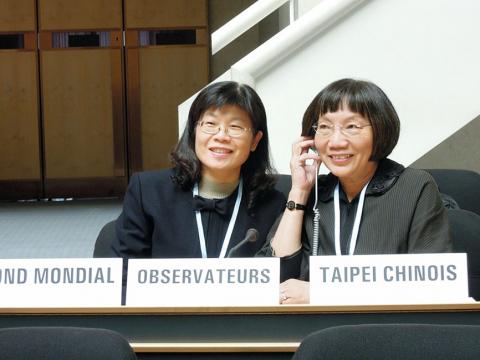Taiwan Solidarity Union (TSU) and Chinese Nationalist Party (KMT) legislators attending the World Health Assembly’s annual summit in Geneva yesterday criticized references by President Ma Ying-jeou (馬英九) to “one country, two areas” (一國兩區) made during his inaugural address on Sunday and said Taiwan should be able to join the WHO under its own name.
The Taipei Economic and Cultural Office in Geneva held a cocktail party in honor of Ma’s inauguration that was attended by the ministers of health from at least 12 countries with which Taiwan has diplomatic ties.
During the party, TSU Legislator Lin Shih-chia (林世嘉) thanked the representatives for their nations’ longtime support of Taiwan and expressed Taiwan’s willingness to bolster global health improvement initiatives.

Photo: CNA
“I wish to remind everyone that Taiwan is not a part of China; Taiwan is Taiwan, it is not China. According to UN Resolution 2758 of 1971, Beijing is the only legal representative of China in the UN; there is no “one country, two areas,” she said in her speech.
“Taiwan is a sovereign, independent country, and the only way to join the WHO is to join under the name of Taiwan, and I think all here agree with me,” she said.
KMT Legislator Su Ching-chuan (蘇清泉) confirmed his support for the idea, saying that while he and Lin were from different political parties, “we share the same opinion” on the issue, adding a call for all diplomatic allies present to continue to support Taiwan’s endeavors to not only join the WHO as a full member, but also participate more dynamically in international organizations.
The speech elicited a frank statement from the minister of health from the Republic of Nauru, who said that although his comment was likely to “offend” some people, the truth is that Taiwan is a sovereign, independent country and should therefore be able to participate in the WHO as a full member.
Meanwhile, in an international telephone interview, Lin told reporters from Taiwan that Ma’s mention of “one country, two areas” in his inaugural address and definition of “one China,” the Republic of China (ROC), was not only not recognized in international diplomatic circles, but would also ensure that Taiwan would never be able to join the WHO or the UN.
Instead, comments like that would only let the international community mistakenly think that the Taiwanese government accepts China’s “one China” framework and that Taiwan is only an area under China, Lin said.
She added that such misconceptions would only undermine Taiwan’s claims of sovereignty and lessen the opportunities in which Taiwan can participate in the international community.
Lin said that it was only by focusing on its objective of joining the WHO and the UN as a member state that the name of Taiwan and its sovereignty would be safeguarded.
Translated by Jake Chung, Staff Writer

Alain Robert, known as the "French Spider-Man," praised Alex Honnold as exceptionally well-prepared after the US climber completed a free solo ascent of Taipei 101 yesterday. Robert said Honnold's ascent of the 508m-tall skyscraper in just more than one-and-a-half hours without using safety ropes or equipment was a remarkable achievement. "This is my life," he said in an interview conducted in French, adding that he liked the feeling of being "on the edge of danger." The 63-year-old Frenchman climbed Taipei 101 using ropes in December 2004, taking about four hours to reach the top. On a one-to-10 scale of difficulty, Robert said Taipei 101

Nipah virus infection is to be officially listed as a category 5 notifiable infectious disease in Taiwan in March, while clinical treatment guidelines are being formulated, the Centers for Disease Control (CDC) said yesterday. With Nipah infections being reported in other countries and considering its relatively high fatality rate, the centers on Jan. 16 announced that it would be listed as a notifiable infectious disease to bolster the nation’s systematic early warning system and increase public awareness, the CDC said. Bangladesh reported four fatal cases last year in separate districts, with three linked to raw date palm sap consumption, CDC Epidemic Intelligence

Two Taiwanese prosecutors were questioned by Chinese security personnel at their hotel during a trip to China’s Henan Province this month, the Mainland Affairs Council (MAC) said yesterday. The officers had personal information on the prosecutors, including “when they were assigned to their posts, their work locations and job titles,” MAC Deputy Minister and spokesman Liang Wen-chieh (梁文傑) said. On top of asking about their agencies and positions, the officers also questioned the prosecutors about the Cross-Strait Joint Crime-Fighting and Judicial Mutual Assistance Agreement, a pact that serves as the framework for Taiwan-China cooperation on combating crime and providing judicial assistance, Liang

US climber Alex Honnold left Taiwan this morning a day after completing a free-solo ascent of Taipei 101, a feat that drew cheers from onlookers and gained widespread international attention. Honnold yesterday scaled the 101-story skyscraper without a rope or safety harness. The climb — the highest urban free-solo ascent ever attempted — took just more than 90 minutes and was streamed live on Netflix. It was covered by major international news outlets including CNN, the New York Times, the Guardian and the Wall Street Journal. As Honnold prepared to leave Taiwan today, he attracted a crowd when he and his wife, Sanni,